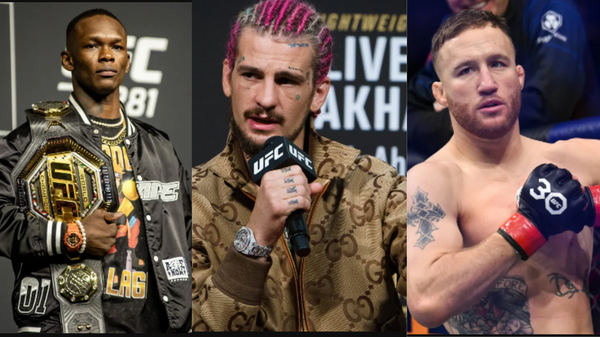
via Imago
courtesy: imago

via Imago
courtesy: imago
In the dynamic world of MMA, where excitement, skillset, and strategy come into play, a new controversy has emerged that has divided the onlookers. Recently, rising star Sean O’Malley dropped a bombshell by claiming he possesses “massive” information that could potentially disrupt the business landscape of mixed martial arts. His target? The practice of MMA managers taking a percentage of fighter bonuses. This revelation has ignited a heated conversation, prompting fighters, pundits, and fans alike to scrutinize the intricate dynamics of fighter compensation and the role of managers in their earnings.
In his recent video, Daniel Cormier offers valuable insights on determining the fairness of pay. However, among this hubbub, one question lingers: Is Sean O’Malley’s stance a correct one, or does the management deserve the bonus money won by the fighter?
ADVERTISEMENT
Article continues below this ad
Daniel cormier shares his opinion on Sean O’Malley’s stance
In a sport where each punch and submission can define a fighter’s career, compensation’s significance cannot be overstressed. Daniel Cormier, who has vehemently sided with O’Malley’s stance. “If I got a knockout, I would give my coaches a little more money the boxing coaches, but the reality is these guys are not entitled to making money on the bonuses,” Cormier declared, laying bare his perspective on the contentious issue. Cormier stated that if any fighter is earning a bonus in the fight, then he has no obligation to share that money with the managers, and it is only & only his money.
O’Malley gains support, highlighting cases like Gaethje and Adesanya, implying fighters don’t route performance bonuses to managers. O’Malley argues fighter bonuses stem from victories, questioning managers’ share due to their in-cage efforts and justifications.
Daniel Cormier further emphasized this point using an example. He pointed out that fighters like Justin Gaethje, when they enter the octagon and perform well, earn bonuses. They do not have to pay a portion of their earnings to Ali Abdelaziz, or at least that’s what they believe. Cormier expressed this by saying, “When Justin Gaethje steps into the octagon, fights those fights, and delivers such great performances, he doesn’t have to pay out to Abdelaziz.”
ADVERTISEMENT
Article continues below this ad
The origins of the controversy
Sean O’Malley has been vocal in expressing his grievances against the domain of MMA managers for a considerable time. Under the Alias ‘Sugar,’ O’Malley, who has handled the mantle of self-management since the past July, levels accusations against these intermediaries, contending that they disproportionately siphon a substantial portion from the money earned by fighters, all while contributing negligibly to their cause. While abstaining from explicit attribution, O’Malley is implying his inclination toward an impending exposé that casts a probing light upon the realm of MMA management, a narrative thread that has gained momentum in recent times

via Getty
LAS VEGAS, NV – JULY 10: (L-R) SeanO’Malley prepares to fight Kris Moutinho in their Bantamweight bout during UFC 264 at T-Mobile Arena on July 10, 2021, in Las Vegas, Nevada, United States. (Photo by Louis Grasse/PxImages/Icon Sportswire via Getty Images)
Former UFC champion Daniel Cormier’s alignment with O’Malley’s viewpoint sheds light on the debate. O’Malley’s stance, supported by examples like Gaethje and Adesanya, questions the role of managers in fighter bonuses. Cormier’s analogy underscores this, asserting that fighters like Gaethje aren’t obligated to share their bonuses with managers. O’Malley’s persistent critique of MMA managers hints at an impending exposé. This discourse signals an evolving narrative that challenges the financial dynamics of the sport.
ADVERTISEMENT
Article continues below this ad
Watch this story: “They’re Stealing Money From Fighters” – Gearing Up for First Title Shot, Sean O’Malley Levels Heinous Accusations on MMA Managers Before UFC 292
ADVERTISEMENT
ADVERTISEMENT
ADVERTISEMENT
ADVERTISEMENT

